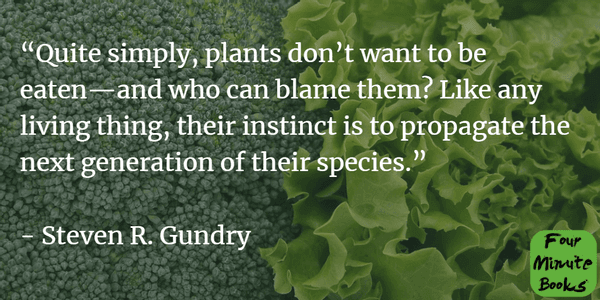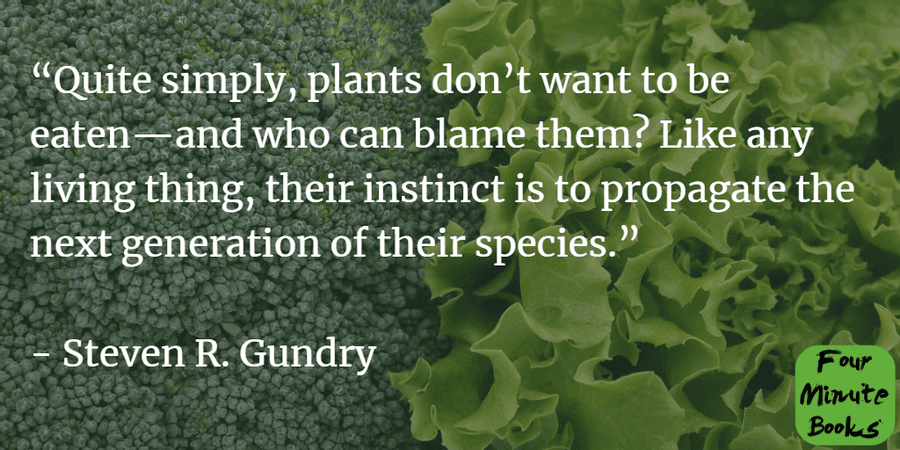The Plant Paradox Summary
Curated from: fourminutebooks.com
Ideas, facts & insights covering these topics:
16 ideas
·4.57K reads
18
4
Explore the World's Best Ideas
Join today and uncover 100+ curated journeys from 50+ topics. Unlock access to our mobile app with extensive features.
The Plant Paradox - Book Summary
The Plant Paradox helps you make better food decisions and eat healthier by arguing that some plant foods that we think are healthy can actually be harming us and making it harder to lose weight.
18
463 reads
Author Quote
"Quite simply, plants don't want to be eaten - and who can blame them? Like any living thing, their instinct is to propagate the next generation of their species."
-Stecen R. Gundry
17
504 reads
Book Overview
Health foods and diets are more popular than ever. You’ve probably heard the buzz around so-called superfoods like Kale, blueberries, or acai. And you are probably pretty aware that certain foods, like things deep-fried or full of added sugar, should be avoided. So avoiding the bad and eating plenty of fruits, veggies, and whole grains is the key to health, why are rates of obesity and inflammation-related diseases higher than ever?
17
359 reads
Look no further than Dr. Steven R. Gundry ‘s book, The Plant Paradox: The Hidden Dangers in “Healthy” Foods That Cause Disease and Weight Gain . He’s a former professor of cardiothoracic surgery and the director of the Center for Restorative Medicine in California. In his book, he alerts us to the dangers of certain plant foods you have probably deemed healthy.
17
277 reads
He lays out which plant foods we should be avoiding, according to his research. He advises what to eat instead to have more energy, help your digestion, reduce inflammation, and maintain optimal weight. Gundry explains how the nutritional value of our fruits and vegetables have changed, and what our ancestor’s diets can teach us about what we should consume. I’ll be honest, some of it seems a bit controversial, but I suggest keeping an open mind and you will definitely learn something.
17
286 reads
Top 3 Lessons From The Voo
- Plants defend themselves with proteins that confuse the human mind and may cause weight gain.
- Whole-grain foods contain a protein known as lectin that can make your body attack itself.
- Start the Plant Paradox Program by cutting out the bad, doing a three-day cleanse, and taking supplements and you will start feeling better.
18
362 reads
Lesson 1: Plants might make you experience mental cloudiness and weight gain because of the proteins they use to defend themselves.
We all know that animals evolve to avoid predators. Think of a Monarch caterpillar, poisonous to birds, or a cuttlefish that can change color to avoid being seen. But did you know that plants also have found ways to protect themselves? One secret weapon that a plant has to defend itself is in the form of the protein lectin.
17
290 reads
Lectin exists in the seeds, leaves, grains, and skins of most plants . When an animal consumes lectin, the protein binds to sugar molecules in the animal’s brain and nerves, causing them to not function properly. The result is brain fog, which causes trouble focusing and memory difficulty. The sole purpose of lectin is to teach animals that they shouldn’t eat these plants in the future.
18
278 reads
The bad news for humans is that it also causes brain fog and weight issues. One particularly bad culprit is the lectin found in wheat. It causes sugar to enter our fat cells , where it is converted to fat and makes us gain weight. For our ancestors, having a “wheat belly” was an effective way to survive long winters. This made it a valuable part of their diet. For us, the side effects aren’t so welcome.
17
260 reads
Lesson 2: Your body can attack itself when you consume whole-grain foods because of the protein lectin.
The side effects of wheat lectin don’t end at weight gain. But first, we need to understand a little about the way digestion works.
Your gastrointestinal tract contains trillions of microbes that help you convert food to energy. Without these precious gut bacteria, you would starve to death . So your body makes sure to keep them in the intestines. If they are somehow able to escape, your body will see them as a foreign invader and essentially begin attacking itself.
18
240 reads
So where do lectins come in? Lectins increase the permeability of the intestinal tract and allow valuable microbes to spill out .
The reason we have this risk today is that whole grain has become so popular as a health food. For centuries societies removed the bran, or the part containing the lectin. But now that whole grain is touted as much more healthy, people are consuming more lectin as a result.
This increases the risk of developing autoimmune disorders such as diabetes and Crohn’s disease.
20
235 reads
Lesson 3: Avoiding certain foods, doing three-day cleanse, and taking supplements will get you on the right track to full health.
Like many diets, the author’s Plant Paradox Program tells you what foods you should cut out of your diet. He believes what you don’t eat is more important than what you do eat because eating the wrong things will lead to a harmful reaction in your body.
The author advises avoiding all legumes, which consist of lentils, peas, and all types of beans. These contain the highest lectin count. Also drop potatoes, cucumbers, tomatoes, and any fruit not in season. And obviously nothing containing wheat flour. A full list can be found online.
18
246 reads
A report examining the nutrient value of fruits and vegetables since 1940 showed a steady decline in vitamins and minerals. One explanation could be that we are using stronger fertilizers and pesticides.
Luckily, nowadays we can supplement to get the vitamins our body desperately needs. The author advises taking vitamin B12 and vitamin D especially as they are so important. This way we can fill in the gaps where our diet can’t.
19
191 reads
The Plant Paradox - Book Review
I’ve been wondering when a book would have me going “what the heck did I just read?!” and this book is it. I don’t know if I believe anything in The Plant Paradox ! There might be something to the idea that plants defend themselves against predators like us. But why we should discourage things that are known to help with heart disease and cancer such as whole grains, legumes, and some vegetables?! I would definitely do my own research after reading this one.
18
177 reads
Who would I recommend The Plant Paradox to?
The 52-year-old nutrition professor who wants a different perspective on plants, the 34-year-old that is curious about leaky gut because they think they might have it, and anyone who wants to try a semi-crazy diet plan to see if it might work.
17
215 reads
IDEAS CURATED BY
CURATOR'S NOTE
The Plant Paradox - Book Summary
“
Tom Joad's ideas are part of this journey:
Learn more about exerciseandfitness with this collection
How to overcome unwanted thoughts
How to manage intrusive thoughts
How to change your attitude towards intrusive thoughts
Related collections
Similar ideas
1 idea
3 ideas
10 ideas
Read & Learn
20x Faster
without
deepstash
with
deepstash
with
deepstash
Personalized microlearning
—
100+ Learning Journeys
—
Access to 200,000+ ideas
—
Access to the mobile app
—
Unlimited idea saving
—
—
Unlimited history
—
—
Unlimited listening to ideas
—
—
Downloading & offline access
—
—
Supercharge your mind with one idea per day
Enter your email and spend 1 minute every day to learn something new.
I agree to receive email updates

